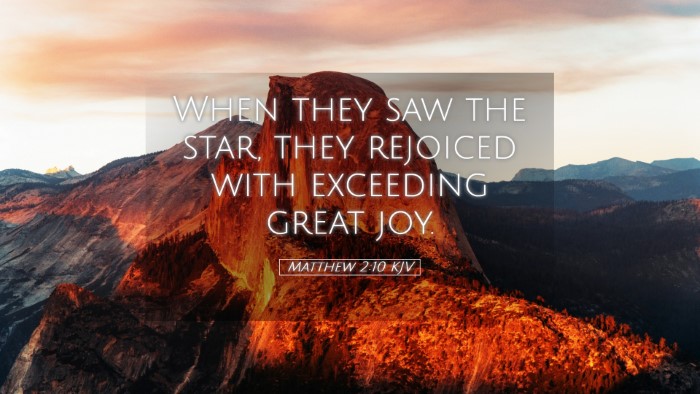Commentary on Matthew 2:10
The verse Matthew 2:10 states: "When they saw the star, they rejoiced with exceeding great joy." This moment captures the response of the wise men upon observing the star that indicated the birth of the Messiah.
Contextual Analysis
This passage is situated within the narrative of the visit of the Magi to Jerusalem, seeking the newborn king. The preceding verses (Matthew 2:1-9) establish the setting, where the Magi inquire about the location of Jesus's birth, indicating a significant event of cosmic and theological importance. The temporal and spatial dimensions of their journey amplify the magnitude of their discovery.
Historical Significance
The Magi were likely learned men from the East, possibly connected to Persian or Babylonian traditions. Their journey signifies the acknowledgment of Jesus' kingship not only by the Jews but by Gentiles. Matthew emphasizes this inclusivity throughout his Gospel.
The Star as a Symbol
The star plays a crucial role in both guiding the Magi and symbolizing divine revelation. Various commentaries provide insights into its significance:
-
Matthew Henry:
Henry notes that the star was a miraculous sign, highlighting God's providence in revealing the birth of Christ to those seeking truth. The star reflects God’s willingness to make known His plans to all nations.
-
Alfred Barnes:
Barnes describes the star as a specific celestial phenomenon that had appeared in prophecy, connecting it with the anticipated Messiah. The joy upon its sight indicates the fulfillment of prophecies and the hope they carried.
-
Adam Clarke:
Clarke suggests that the star’s purpose extends beyond navigation; it symbolizes enlightenment and revelation, illuminating the way not only physically but spiritually as well. The celestial body signifies divine approval of the event it heralds.
Joy and Exuberance
The phrase “rejoiced with exceeding great joy” indicates an outpouring of emotion that transcends mere happiness.
-
Matthew Henry:
Henry emphasizes that this joy is indicative of the hope and expectations that accompany the recognition of the Messiah. Their joy can be understood as a response not only to the physical sign (the star) but to the spiritual reality it represents: the arrival of the long-awaited Savior.
-
Albert Barnes:
Barnes points out that this "exceeding great joy" reflects a profound spiritual awakening. The Magi’s joy serves as an example of authentic worship characterized by an understanding of God’s work in the world.
-
Adam Clarke:
Clarke interprets their joy as a vibrant expression of faith and hope, acknowledging the significance of Christ’s birth for humanity. This response illustrates a longing for redemption and a recognition of the divine presence among them.
Theological Insights
This verse invites theological reflection on several key themes:
-
Divine Revelation:
The star symbolizes divine guidance and revelation, showing that God actively reveals His mysteries to those who earnestly seek Him. This act anticipates the New Covenant's inclusivity, where both Jews and Gentiles are invited into a relationship with God.
-
Joy in Worship:
The joy expressed by the Magi serves as an enduring reminder for believers to respond to God's revelation with exuberance and gratitude. Joy is a recurring theme in the Christian experience, recognizing God's continual work in the world.
-
Hope and Expectation:
The Magi’s joy reflects the hope of redemption fulfilled in Christ. Their reaction sets a precedent for the response of all who understand the significance of Jesus' birth and His impact on humanity.
Application for Today
For pastors, students, theologians, and scholars, this verse challenges us to examine our own responses to God’s revelation in our lives. It asks us:
- How do we recognize the signs of God's activity today?
- Are we responding with the same joy and anticipation as the Magi?
- What does our joy look like in the context of worship and community?
In conclusion, Matthew 2:10 invites profound contemplation and encourages us to engage with the text at a personal and communal level. May we find our hearts stirred, just as the Magi were, to rejoice in the presence of our King.


